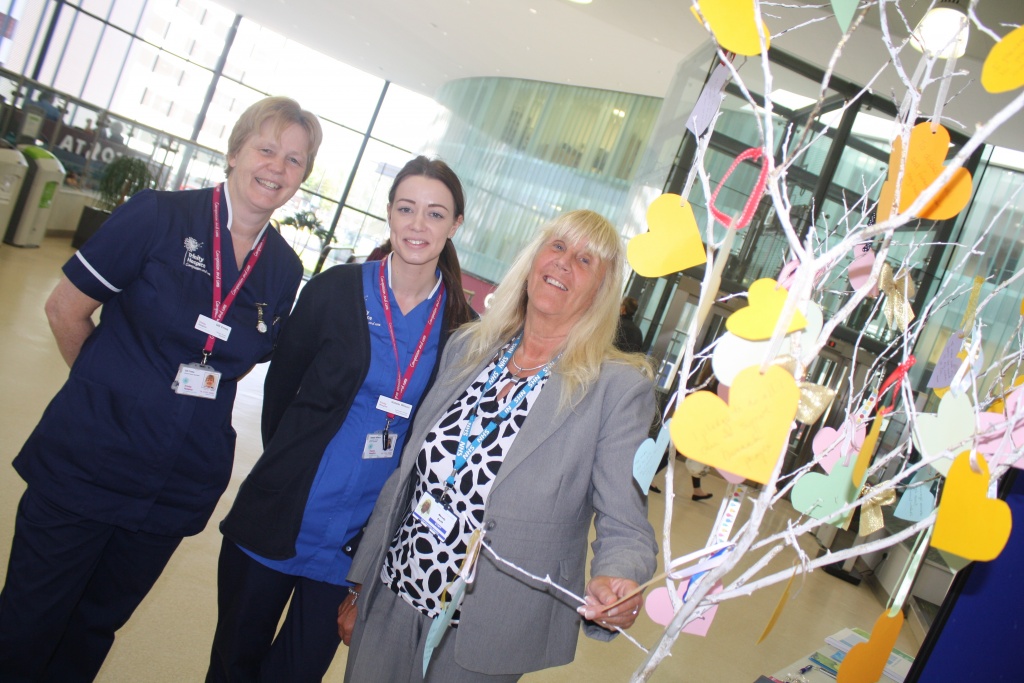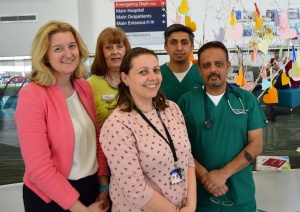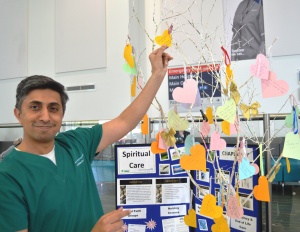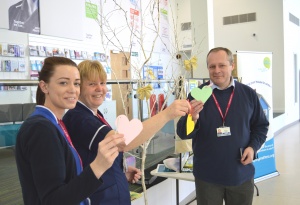
Chief Executive of Blackpool Teaching Hospitals, Wendy Swift (right), makes a Dying Matters Awareness Week pledge with Clinical Nurse Specialists, Gill Cross and Natalie Wilson
Patients, staff and visitors have been making special pledges as part of national Dying Matters Awareness Week from May 8 to 12.
The theme of the week is ‘What Can You Do?’ and participants have made all sorts of pledges from promising to let friends and family know their wishes regarding their death to pledging to support bereaved people.
Wendy Swift, Chief Executive of the Trust, is one of the many people who have made a pledge.
In partnership with Trinity Hospice, there have been information stands at Blackpool Victoria Hospital, Clifton Hospital and community venues staffed by representatives from the Trust’s End of Life and Palliative Care Team.
The Trust’s new Lead Nurse for Cancer and End of Life Care, Jackie Brunton, said: “I started working within the Trust at the beginning of April and have been really impressed in the progress made for provision of end of life care.
“Dying Matters week is an opportunity for us to raise awareness. The week is an opportunity to understand what I can do to support and empower staff to have what can be difficult but important conversations. This enables them to support our patients and their families and friends to discuss what is important for them to make their decisions and plan their care.”

Harriet Preston (front, centre) Consultant in Palliative Medicine and Lead for End of Life Care with (from left) Laura Edwards, Community Consultant in Palliative Medicine; Wendy Lewis-Cordwell, North West Bereavement Consultant for Child Bereavement UK; Dr Mazhar Alam from the Trust’s Acute Medical Unit and Dr S A Asghar
Gill Cross, a Clinical Nurse Specialist and a member of the Palliative Care Team, said talking more openly about dying could help people to make the most of life and support loved ones.
She said: “Dying is a natural thing to talk about. It’s good for people of all ages to talk about what they might like to happen and to make plans.
“As a team, we work closely with patients to find out what is important to them and to achieve their goals.
“We sit down and talk with patients and family members about their wishes. Listening is a big part of our role. We look at the whole person and the whole family.
“It’s not just about where people want to be when they die; it’s about how they want to be cared for while they are with us.
“It’s about quality of life. For example, we can arrange a fast discharge from hospital if someone is in the last weeks or days of life.
“People share a lot of things with us. We are in a privileged position. I love my job; it’s really satisfying. If I can improve someone’s quality of life by easing their pain or making their life better in some way, I think that is everything.”
Dying Matters information has also been circulated to all GP practices across Blackpool, Fylde and Wyre in collaboration with Trinity Hospice.
Research for Dying Matters has found that many people have specific wishes about their end of life care or what they would like to happen to them after their death but a reluctance to discuss these issues makes it much less likely that these will be met.
Claire Henry, Chief Executive of the Dying Matters Coalition and the National Council for Palliative Care, said: “Talking about dying, death and bereavement is in everyone’s interests as it can help ensure that all of us can get the care and support we want, where we want it, at the end of our lives.
“Through being more confident in talking about dying, we can make a big difference.”
See www.dyingmatters.org for more information.
Follow Dying Matters on Twitter @Dying Matters

